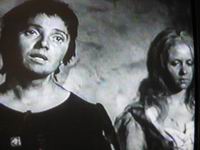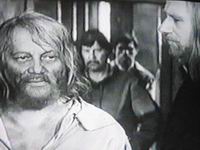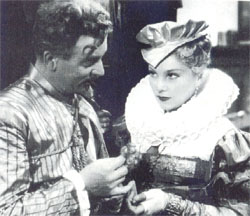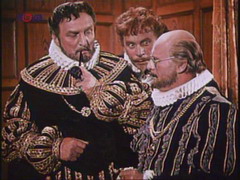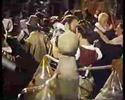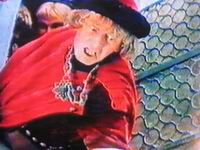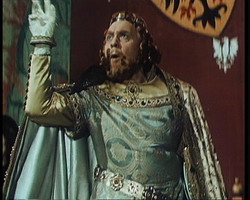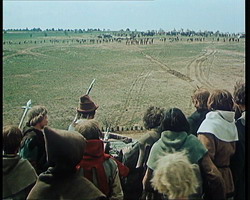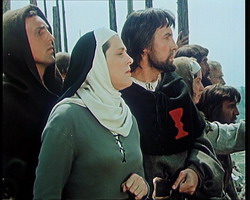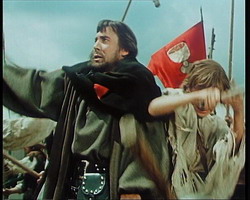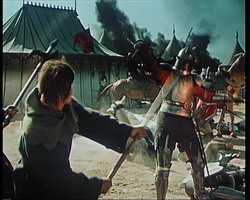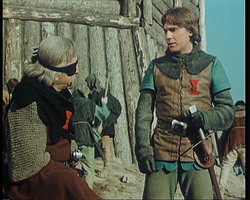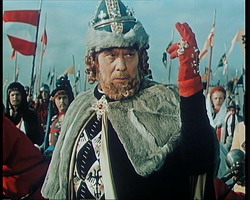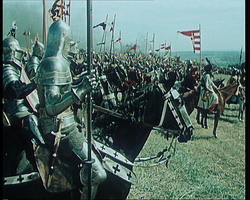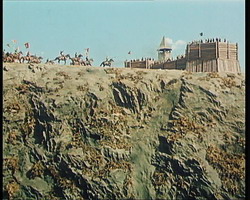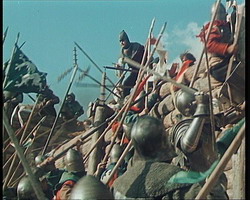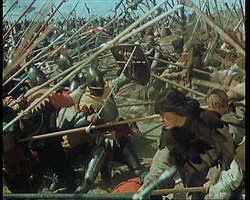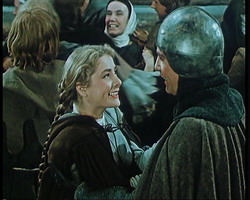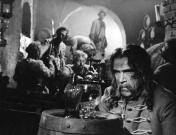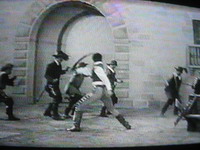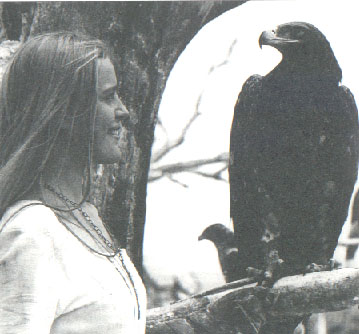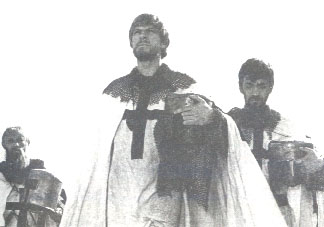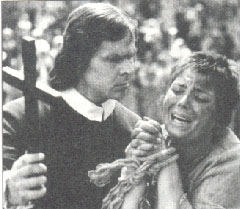Personally I love historical movies, especially when they contain enough action scenes. Unfortunately, it is not the type of a film genre that would find sufficient use in the Middle European region. Naturally, something like the Four Musketeers is quite improbable in Prague of the 17th century. However, there are good historical movies worth mentioning. First of all, there are colour, large-scale historical spectacles that came into being especially during the fifties, when they were richly sponsored by the communistic regime. They usually dealt with great personalities of Czech history (mostly with rebels and revolutionaries, of course). During the sixties they were followed by more psychological, mostly black-and-white movies of a less formate. Since late 70's the era of the Czech historical film practically ended. Those few films that came into being since that time are virtually not worth mentioning.
Among the "large-scale titles" I would especially list Otakar Vávra's hussite trilogy that is often criticized for its "communistic idealization" (it was filmed during the 50's), but it contains good action scenes, very impressive music and, in general, very solid actor's performances that are tolerably pathetic. Further, there is a pearl of Czech cinema, Frič's Císařův pekař (The Emperor's Baker), a very entertaining historical comedy from the time of Rudolf II. (1576-1612). Another movie in this style is Vávra's Cech panen kutnohorských (The Guild Of Kutná Hora's Maidens) that belongs to the best that was filmed in Czechoslovakia before World War II (a prize at the film festival in Venice, which was the most respected European film award of that time). Vávra is also an author of a horror dish from the time of witch hunts - Kladivo na čarodějnice (The Witchhammer) that may be his best piece at all. However, the most respected author of historical spectacles in former Czechoslovakia was František Vláčil. His movies usually dealt with dramatic human conflicts and contained no big action scenes. However, the most remarkable thing in them was an impressive visual style that captivates the spectator. A classical example of this film treatment is Ďáblova past (The Devil's Trap) and especially Markéta Lazarova that is even regarded as the best Czech movie of all time. However, in this latter case the lyric component can be quite boring for a lot of people (except film critics). In the end of this list I can't forget Zeman's Bláznova kronika (The Jester's Chronicle) that is perhaps the only Czech historical title that could be called "a historical adventure".
The best Czech historical movies according to the public inquiry on České filmové nebe (to November 6th 2002)
1. Údolí včel (1967)...46 votes (ø 9,07)
2. Kladivo na čarodějnice (1969)...28 votes (ø 8,89)
3. Císařův pekař a pekařův císař (1951)...34 votes (ø 8,24)
13 movies included
Cech panen kutnohorských (1938)
(The Guild of Kutná Hora's maidens)
Director: Otakar Vávra. Screenplay: Otakar Vávra, Zdeněk Štěpánek. Music: Jaroslav Křička, Miloš Smatek. Starring: Zdeněk Štěpánek (Mikuláš Dačický z Heslova), Ladislav Pešek (his servant Očko), Adina Mandlová (Rozina), Václav Vydra sen. (the Master coiner), Helena Friedlová (his wife), František Smolík (Tříska), Jiřina Šejbalová (his wife), Theodor Pištěk (the reeve Vodňanský), Hana Vítová (Alžběta) etc.
This historical comedy belongs to the best movies of the First republic era and got a prize at the international festival in Venice. It is based on a dramatical play depicting a sequence from the life of renaissance moralist Mikuláš Dačický z Heslova. It is actually a sequence from the part of his life before he became a moralist, i. e. when he had been a renowned drunker and tempter of women in Kutná Hora.
This movie that was filmed shortly before Munich 1938 had a strong nationalist, anti-German message.
Zdeněk Štěpánek as Mikuláš and Jiřina Šejbalová
Císařův pekař, pekařův císař (1951)
(The Emperor's Baker, The Baker's Emperor)
Director: Martin Frič. Screenplay: Jan Werich, Martin Frič, Jiří Brdečka. Music: Julius Kalaš. Starring: Jan Werich (Rudolf II./the baker Matěj), Marie Vášová (the countess Stradova), Nataša Gollová (Kateřina-Sirael), Bohuš Záhorský (the chamberlain Lang), Jiří Plachý (Kelly), Zdeněk Štěpánek (the marshall Rusworm), František Filipovský (the astrologer), František Černý (Scotta) etc.
A very successful (pseudo)historical comedy based on legends about Golem, an artifical human created by the rabbin Loewy. The main intrigue turns on a mistaken identity of young baker Matěj and the old Emperor Rudolf II., who is looking for a potion of youth. The court regards Matěj as Rudolf, who became young, and Matěj uses this mistake very sagaciously. However, at first he must square up with a group of conspirators and then usefuly utilize the strength of the revived giant Golem.
Císařův pekař is an excellent movie, full of smart humour. You will see, for example, how to break the atom of iron by a hammer, how to recognize the right Mona Lisa from the false ones, or how to invent an effective adhesive. It was the first big post-war role for Jan Werich, who returned from the overseas. Werich again gave a big opportunity to Nataša Gollová, who recuperated from her postwar fate.
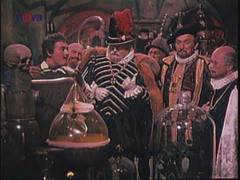
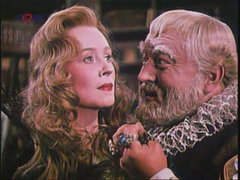
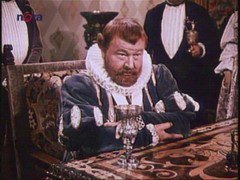
The title song sung by Jan Werich "Ten dělá to a ten zas tohle" (which can be translated approximately like "This here does this and that over there does that") clearly had a propaganda purpose, and incites to the cooperation of intelligence with working people, so that eventually "when we all give everything to everybody, we all will have everything together". Still, it belongs to the tops of this movie
http://www.meteleskublesku.cz/media/30/snd/29.mp3
The title melody
http://www.meteleskublesku.cz/media/30/snd/01.mp3
And the same song sung by Jan Werich on
Jan Roháč z Dubé (1947)
(Jan Roháč of Dubé)
Director: Vladimír Borský. Screenplay: Vladimír Borský, Otakar Růžička, Soňa Spášová, after a drama of Alois Jirásek. Music: Otakar Jeremiáš. Starring: Otomar Korbelář (Jan Roháč of Dubé), Ladislav Boháč (Jan Rokycana), Emil Bolek (gunsmith Zelený), Felix le Breux (Výšek Račičký), Otto Čermák (Zikmund), Gustav Ekl (Orságh), Lili Hodačová (Ludmila), Rudolf Deyl sen. (Hrdinka), František Kulhánek (Ptáček of Pirkenštejn).
A movie relating about events that historically followed the later hussite trilogy. In 1434, the radical hussite wing composed of taborites and orphans was defeated by moderate hussites and catholic lords at the battlefield of Lipany. Taborite hetman Jan Roháč of Dubé survived, being captured by his former co-belligerents. He disagrees with the following negotiations leading to the coronation of hatred Zikmund, and goes to his castle Sion, where he wants to defend radical hussite ideas. Zikmund sends an army to Sion and the castle is besieged and eventually captured. Roháč and several tens of his followers are then sentenced to death and executed.
The first Czech(oslovak) full-length colour movie that lies in the shadow of Vávra's hussite trilogy. Due to its theatrical stylization it is not especially attractive, but I confess that I saw it a long time ago and I would have to see it again to judge its quality. Also the colours suffered a lot.
Jan Hus (1954)
Director: Otakar Vávra. Screenplay: Miloš Václav Kratochvíl, Otakar Vávra (based on a novel of Alois Jirásek). Music: Jiří Srnka. Starring: Zdeněk Štěpánek (Jan Hus), Karel Höger (Václav IV.), Jan Pivec (Zikmund), Vlasta Matulová (the queen Žofie), Ladislav Pešek (the clown Miserere), Otomar Krejča (Páleč), Marie Tomášová (Johanka) etc.
Prague 1412: Master Jan Hus preaches against immorality in the Church and the selling of indulgences. A revolt of poor people in Prague provoked by Master's ideas is suppressed and three young craftsmen are publicly executed. Czech king Václav IV. is no longer willing to protect Hus and Master is forced to leave the city. He finds refuge at his noble sympathizers in south Bohemia, where he preaches "in the mountains" to large masses of people and writes his most important works. In 1414, Hus is called on to the council in Konstanz to state his thesis, but after an artifical process he is burned to death (on July 6th 1415).
A big role for Zdeněk Štěpánek, who showed one of the most brilliant actor's performances in his lifelong career. Perhaps the only serious imperfection of this movie is its communistic ideologization. But it's not as terrible as many the so-called "critics" after 1989 maintain. The main "problem" actually lies in the portraying of hussite ideas that were largely identical with later communistic ideologies. The depiction of Hus is also not correct, because he was a fat, bald man (the false idea about his look as a bony man came into being in the 19th century, when painter Mikuláš Aleš created Hus' romantic portrait before the counsil.). However, as a whole, the film is very impressive and moving.
On the background of Hus' story, we also watch fates of figures of the original Jirásek's novel that were originally somewhat bigger (they say; I have never read the book). Jirásek was actually inspired by real events or documented anecdotes, and freely connected them by means of his fabricated heroes. In the beginning beautiful Johanka loses his fresh husband, who was involved in the rebellion in 1412. Then she becomes a loyal Master's hearer and after his death, she is engaged in the hussite movement in South Bohemia.
Psohlavci (1955)
(The Dogheads)
Director: Martin Frič. Screenplay: Martin Frič, Otakar Kirchner, Jiří Mařánek after a novel of Alois Jirásek. Music: Emil F. Burian. Starring: Vladimír Ráž (Jan Sladký-Kozina), Jana Dítětová (Hančí), Jarmila Kurandová (mother), Zdeněk Štěpánek (old man), František Kovařík (Kryštof Hrubý), Ladislav Pešek (Řehůřek), Jiřina Steimarová (Dorla), Jaroslav Průcha (Přibek), Miloš Nedbal (Lamminger of Albenreuth).
One of glorifying historical movies that were typical for its epoch. The authors were inspired by a historical novel of Alois Jirásek, who idealized a figure of Jan Sladký-Kozina (1652-1695), a legendary leader of a peasant revolt from the end of the 17th century. Kozina symbolizes a resistance of Czech people against new German lords, who unscrupuously usurped the territory of Czech lands after the unhappy battle on Bílá hora (White Mountain) in 1620 that closed the era of Czech independence for 300 years. He was actually something like "a Czech Rob Roy", a simple peasant, but a very brave man, who protested against the violation of privilegees that were guaranteed to the so-called Chods, traditional guards of the South Bohemian frontier. Kozina publicly came out against the new lord of Chods, Lamminger of Albenreuth (nicknamed "Lomikar"), but was subsequently prisoned and executed. The name of the movie was inspired by the characteristic symbol of the Chods, a doghead (but to be sincere, it was fabricated by Jirásek; the real sign of the Chods were bordermen's boots).
The movie runs from time to time on TV, but it is not especially memorable. Frankly, I don't remember it well, but it doesn't deviate from typical glorifying movies.
Jan Žižka (1955)
Director: Otakar Vávra. Screenplay: Miloš Václav Kratochvíl, Otakar Vávra (based on a novel of Alois Jirásek). Music: Jiří Srnka. Starring: Zdeněk Štěpánek (Jan Žižka), František Horák (Jan Želivský), Karel Höger (Václav IV.), Vlasta Matulová (the queen Žofie), Ladislav Pešek (the clown Miserere), Jan Pivec (Zikmund), Marie Tomášová (Johanka), Vladimír Ráž (Tomeš), Otto Lackovič (Ondřej) etc.
1419: The atmosphere in Prague after Hus' death is very tense. Several rebels are prisoned and radical priest Jan Želivský leads large masses of people to the New Town's council house occupied by hatred councillors, where the prisoners are kept. The councillors refuse demands lodged by Želivský and several people are killed by stones thrown from windows. This act provokes ennoyance and leads to an overt uprising: the gate of the council house is broken and the councillors are thrown out of windows and killed (the so-called First Prague defenestration). When the king hears about this event, he is enormously upset and dies of heart failure. In the night after his death the queen with courtiers leave the city. The hussite revolution begins and the rebels elect Jan Žižka as their leader. However, due to clashes with the hussite nobility willing to negotiate with Václav's brother, the Emperor Zikmund (Sigismund), Žižka leaves Prague, because he doesn't want to have any enemies in his back. After a short stay in Plzeň, where he also encounters hostility, he heads to a new town called Tábor that was found by hussites in south Bohemia. During the way he is chased by two catholic troops, the johanites of Strakonice and a royal cavalry. Hussite infantry warriors are too slow and near a village Sudoměř (March 25th, 1420) they are forced to face the vast superiority of iron lords in the field. The fate of the revollution now lies on Žižka's back and he uses a special tactics that he learned as a mercenary in Poland - the waggon wall.
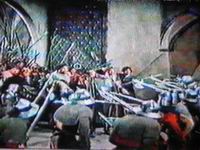
Again a very impressive performance of Zdeněk Štěpánek. And again, this movie is sharply criticized by "modern critics" because of its communistic idealization that portrays hussites as "early communists" building a shining future. But at least for me, those few engaged dialogues are not important. On the contrary, I admire Vávra's sense for the spirit of the age, and - mostly - excellent and trustworthy actor's performances. If someone tried to make a movie of this sort today, it would end absolutely terribly. Besides that, it contains great soundtrack of Jiří Srnka based on authentic hussite songs.
I think that in this case, the authors should devote more time to Jirásek's heroes, because the point of their fates is emotionally impressive. In this part, Johanka helps in gathering Master's hearers and supporters in South Bohemia, where they want to found "the selected place in the time of adversity" - the fortress Tábor. They are wildly persecuted and pursued by the Rožmberks (Rosenbergs), the mightiest lords of South Bohemia, who are a symbol of oppression and injustice. Johanka meets a group of people heading to Tábor, and it happens that two brothers, Tomeš and Ondřej, fall in love with her, which leads to their mutual grudge. But the verdict of destiny is cruel and unexpected, and decrees during the first big battle near Sudoměř.
Proti všem (1957)
(Against all)
Director: Otakar Vávra. Screenplay: Miloš Václav Kratochvíl, Otakar Vávra (based on a novel of Alois Jirásek). Music: Jiří Srnka. Starring: Zdeněk Štěpánek (Jan Žižka), Gustav Hilmar (Ctibor of Hvozdno), Vlasta Matulová (Zdena), Petr Haničinec (Ondřej of Hvozdno), Miroslav Doležal (Bydlinský), Bedřich Karen (the provost), Stanislav Neumann (the sacristian), Jana Rybářová (Marta), Jan Pivec (Zikmund), Václav Voska (Kániš, the adamite leader) etc.
1420: After several months Václav's brother, the Emperor Zikmund, prepares a mighty military campaign against the hussites. Since all negotiations failed, hussite nobility in Prague is afraid of his revenge and ask Žižka's táborites for help. Žižka knows that the fall of Prague would be a disaster and he leads an army to the city. Yet simultaneously, Lord of Rožmberk (Rosenberg) together with German dukes collect a numerous army and lead it against Tábor, so the hussites must fight on two fronts. Žižka sends a troop of his riders to Tábor and Rožmberk's army is destroyed by a simultaneous morning attack of the taborites and the cavalry (June 30th). In the meantime, Zikmund's army is slowly gathered on the Letná plain north of the city. Zikmund also seizes the Prague castle and now controls the whole left bank of Vltava. The fortress Vyšehrad on the right bank is also in his hands. Žižka thus orders to quickly build a palisade wall on a hill called Vítkov east of Prague, because it is a key point assuring food supply to the besieged city. Since a direct attack on the city walls would be too risky, Zikmund's army attacks the hussite position on Vítkov that is defended by Žižka and several tens of his táborites (July 14th). During a subsequent fight the hill is almost conquered by the overwhelming superiority of the crusaders, yet suddenly they feel that their rows are pressed to the northern side of the hill and panic breaks out as they learn that it's due to hussite forces coming from Prague through old vineyards on the southern side. The crusaders take to flight across the river and many of them drown in it. Disgusted Zikmund leaves the Letná plain, where he wanted to watch his triumph over "dirty villagers", and after 14 days his demoralized army leaves the whole country. Later the hill Vítkov will get a name after the famous leader, who here resisted the enemy's attack - Žižkov.
Again this movie is ideologically influenced, but it is not anyhow serious. The early stage of the hussite community in Tábor really experimented with "the right order, where everything belongs to everybody". The depiction of the battle on Vítkov is quite trustworthy and monumentally filmed. The richness of the stage is really impressive and Vávra's action scenes can easily match the best of the contemporary film production. Like in the previous two movies, performers of title heroes are very well chosen. Perhaps only unexperienced Jana Rybářová (otherwise a big talent of Czech cinema, who shortly after commited suicide) acts too expressively.
Zikmund: "By God, I promise to annihilate all the heretics from the earth!" Rožmberk's men are already here... ...and still more come... ...but the Taborites make a surprising attack...
Who is it? Hopefully not an enemy? Not the blasphermers?
...and besiegers are swept off. Yet the most important event will take place on Vítek's hill that is being fortified.
The decisive battle begins
Welcome On Vítek's Hill!
A routine of the hussite wars: Proud knights are beaten by peasants' flails
Where are the flailers? Flailers Just Have Set Off! http://www.youtube.com/
...and some happy end, of course...
In the last part of his trilogy, the story discreetly leaves the figures of brothers Ondřej and Tomeš, and concentrates on the fates of the family of yoeman Ctibor of Hvozdno. Ctibor's nephew Ondřej falls in love with a local lord's daughter, who falls in hussite captivity after the fight at Tábor. Ctibor's daughter Zdena is attracted by priest Bydlinský, who pursuades her to join the fanatic sect of the adamites (pikarts). This leads to her quarrel with father, and when the adamites are driven from Tábor, she shares Bydlinský's tragical fate. By the way, the somewhat embarassingly shot scene with the brave woman (Tomeš and Ondřej's mother) on the palisade during the battle on Vítkov is based on a historically documented anecdote!
Ztracenci (1956)
(The Lost)
Director: Miloš Makovec. Screenplay: Miloš Makovec and Jiří Brdečka after a novel of Alois Jirásek. Music: Jan Rychlík. Starring: Gustav Valach (the cuirassier), Stanislav Fišer (the infantryman), Vladimír Hlavatý (the hussar), Alena Vránová (Baruška), Radovan Lukavský (Jíra).
A very good and impressive "little" movie, almost unknown, but it is one of my favourite ones. In the beginning we get into north-west Bohemia during the Austrian-Prussian war in the middle of the 18th century. Three Austrian deserters, a crude cuirasser, a hussar suffering from bad conscience for killing a little child, and an infantryman, are looking for shelter in a house of the infantryman's friend Jíra. The infantryman hopes that he would return home and marry his girl Baruška, but to his surprise, the girl in the meantime married Jíra, because there had been a rumour of his death. After several days the men decide to go away, but when they are leaving the place, they hear Prussian soldiers plundering Jíra's house. They quickly come back and kill them, but one of the Prussians escapes and informs his captain. Before Jíra is prepared to flee with all his property, the Prussians come and began to surround the house. The soldiers decide to shelter Jíra's and Baruška's flight and all die.
By the way, somewhere I read that "ztracenci" is actually a medieval word for "deserters", so my translation may not be correct. But the double sense of the word may have been an intention of the creators. The last big role of "Proud Princess" Alena Vránová for many years.
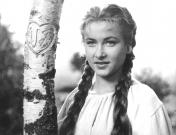
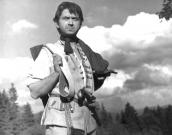
Ďáblova past (1961)
(The Devil's Trap)
Director: František Vláčil. Screenplay: František A. Dvořák, Miloš V. Kratochvíl after a novel of A. Technik Mlýn na ponorné řece (The Mill On A Submersible River). Music: Zdeněk Liška. Starring: Vítězslav Vejražka (the miller Spálený), Vít Olmer (his son Jan), Miroslav Macháček (the priest), Čestmír Řanda (the regent Valečský), Marta Chadimová (Martina), Vlastimil Hašek (the huntsman Filip) etc.
For one hundred years a big mystery surrounds a family of millers in the Moravian carst: How did they ancestors escape from a mill burned by Swedish soldiers during the Thirty Year's War? Are they in connection with the Devil? A new fanatic priest, who comes to that place, wants to find the truth.
A very impressive, captivating movie with mysterious atmosphere, in my opinion even better than Vláčil's other opus Markéta Lazarová. The psychedelic side of Vláčil's work is visible, but it's not as fuzzy as in his later movie Markéta Lazarova.
Another photos from Ďáblova past: http://www.nostalghia.cz/webs/vlacil/galerie/dablova_past.php
Bláznova kronika (1964)
(The Jester's Chronicle)
Director: Karel Zeman. Screenplay: Karel Zeman, Pavel Juráček. Music: Jan Novák. Starring: Petr Kostka (Petr), Miloslav Holub (Matěj), Emília Vašáryová (Lenka), Valentina Thielová (Veronika), Karel Effa (Varga), Vladimír Menšík (the painter), Čestmír Řanda (the warder) etc.
Moravia 1625: Young peasant Petr is caught by an imperial press-gang and is forced to serve in the army against the Danes. He finds a friend, old experienced soldier Matěj, with whom he survives a bleeding battle. After the fight they find a carriage of an enemy officer and want to return home with rich booty. During the way they save young girl Lenka from a mercenary gang. However, presently they are captured by imperial riders, mistakenly regarded as enemy noblemen and subsequently prisoned in a castle. There they spend many following days and their situation changes in dependence on the course of the running war. Once they are favoured by luxurious meals and offers of marriage, another time they are flung into a dungeon. In the end, they succeed to escape from the castle, but Petr and Lenka are caught by imperial soldiers and sentenced to death as deserters. Eventually, they escape again and Matěj decides to hold their pursuers back, despite that he knows that it would mean his certain death.
This movie was made by renowned director Karel Zeman, whose movies attracted attention by an unusual visual style. I have loved this movie since the first time I saw it. It's an adventure according to my gust and Zeman's bizarre humour makes it even more attractive. Some people say that it's too slow-paced, but I have never noticed anything of this sort in it. Or perhaps that I love the grace of young Emília Vašáryová so much that I can't notice such an important film insufficiency :)
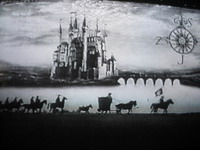
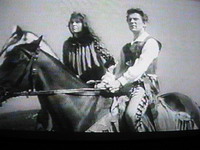
Markéta Lazarova (1967)
(Lazar's Markéta)
Director: František Vláčil. Screenplay: František Pavlíček, František Vláčil after a novel of Vladislav Vančura. Music: Zdeněk Liška. Starring: Josef Kemr (Kozlík), Magda Vašáryová (Markéta Lazarova), Michal Kožúch (Lazar), František Velecký (Mikoláš/speaks Petr Kostka), Naďa Hejná (Kateřina/speaks Antonie Hegerlíková), Ivan Palúch (Adam/speaks Ladislav Trojan), Harry Studt (the old Kristian), Vlastimil Harapes (the young Kristian), Vladimír Menšík (the monk Bernard) etc.
A lyric-epic (or an epic-lyric?) story from the middle of the 13th century regarded by a lot of film critics as the best Czech movie of all-time. It relates about a band of robbers led by knight Kozlík. They kidnap son of a rich German merchant and then daughter of yeoman Lazar, Markéta. The biggest part of the movie deals with a dramatic pursuit of the Kozlík's band by the royal army. In some sequences the drama is interrupted by a detailed view into the psyche of insane monk Bernard...
Exceptionally impressive, when watched in a cinema house with good spatial acoustic. When watched on TV, it may disgust the whole evening to you. Too psychedelic and lyric for my taste. Some people may regard it as a chaotic, fuzzy phantasmagory, and it is true that especially in some final scenes they are right. I had to see it twice to understand, what actually happened in the end. However, Vláčil's approach deserves attention.
Markéta Lazarova was the first big film role for Magda Vašáryová, a student of sociology at Charles University in Prague. At that time nobody knew that 30 years later she would almost become a president.
Magda Vašáryová as Markéta Lazarová with a falcon of an unknown name
Some psychedelic sequences:
http://www.youtube.com/watch?v=zscnjMtTvSc
A Czech Fan Site; See Gallery from this movie
Údolí včel (1967)
(The Valley of Bees)
Director: František Vláčil. Screenplay: Vladimír Körner, František Vláčil. Music: Zdeněk Liška. Starring: Petr Čepek (Ondřej), Jan Kačer (Armin), Věra Galatíková (Lenora), Josef Somr (Rotgier), Petr Štěpánek (Markvart) etc.
Jan Kačer (in the middle) as Armin and Petr Čepek (on the right) as Ondřej.
The second half of the 13th century: In a fling of rage Lord of Vlkov almost kills his son Ondřej. Ondřej survives and his father consecrates him to the Teutonic Order. After many years, young Teutonic knight Ondřej flees from the Baltic sea, because he is not able to sustain monotonous living in the Order and again wants to see his native stronghold Vlkov situated in the "valley of bees". His asketic friend Armin, a fanatic knight, decides to pursuade him and force him to come back. At first Ondřej agrees, but then he decides to kill Armin and go on to Vlkov. Here he finds out that his father is dead and then he falls in love with his stepmother Lenora. He doesn't know that Armin survived and lurks about the stronghold. When Ondřej celebrates a sinful wedding with Lenora, Armin suddenly visits him and after a seeming reconcilation he kills his new wife. Wrathful Ondřej lets Armin worry to death by his dogs, but since he lost everything, he eventually returns back to the Order.
Údolí včel is a very good movie, one of my favourite ones since my early childhood. I especially remember the scene, when Armin drinks from a pool and Ondřej, standing above him, prepares to kill him.
Screenshots from DVD:
http://www.nostalghia.cz/webs/vlacil/clanky/dvd_udoli_vcel_fv_galerie.php
Another photos: http://www.nostalghia.cz/webs/vlacil/galerie/udoli_vcel.php
Kladivo na čarodějnice (1969)
(The Witchhammer)
Eduard Cupák as Vicar Schmidt
Direction: Otakar Vávra. Screenplay: Otakar Vávra, Ester Krumbachová after a novel of Václav Kaplický and records of witching processes. Music: Jiří Srnka + compositions of A. Vivaldi and Adam Michna of Otradovice. Starring: Elo Romančík (Lautner), Vladimír Šmeral (Boblig of Edelstadt), Soňa Valentová (Zuzana), Josef Kemr (Ignác), Lubor Tokoš (Sattler), Blažena Holišová (Sattler's wife), Jaroslava Obermaierová (Sattler's daughter), Jiří Holý (the vicar), Eduard Cupák (vicar Schmidt), Čestmír Řanda (Hutter) etc.
Velké Losiny near Šumperk, northern Moravia, 1678: Due to a minor solecism vicar Schmidt accuses an old woman of witchcraft. Countess de Galle calls on experienced inquisitor Boblig of Edelstadt, who is to investigate the affair. After some time the number of "wizards" grows, because Boblig forces them to false accusations using the largest scale of torturals. Boblig and his compotators empower the property of the condemned people (which are especially the richest people of the town) and send them to death one after another. Educated priest Lautner wants to stop it, but he himself is accussed of wizardry and tortured. In the end, Lautner refuses to betray other "wizards" and so - as the last accused person - he stops another murdering. However, he won't escape his fate on a wood stack.
A rough, depressive drama based on true events, depicting "cruelty of bigotry combined with ruthless greediness and destructiveness of uncontrolled power". Another historical movie of Otakar Vávra (one of his best ones).
